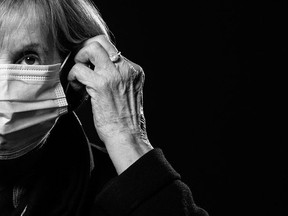Some have argued an inquiry is needed to evaluate the effectiveness and harms of lockdowns, vaccine passports, school closures and other measures
Article content
More than five years after COVID first emerged, amid rising and falling waves, calls are growing for a public inquiry into Canada’s pandemic response on the scale of the Krever inquiry into the country’s tainted blood scandal of the 1980s.
Not everyone agrees on the focus or details.
Some have argued a no-holds-barred inquiry is urgently needed to evaluate the effectiveness and social harms of lockdowns, stay-at-home orders, vaccine passports, school closures and other far-reaching government mandated infection control policies, some of which were never part of pre-existing pandemic plans.
Advertisement 2
Article content
“One of the most powerful things in a democracy is to have access to, what actually happened? How did people make decisions? What was known and not known at certain periods in terms of the vaccine mandates especially, and the lockdowns,” said Canadian medical anthropologist and public health researcher Kevin Bardosh.
“The COVID response was the largest infringement on basic Canadian civil rights and liberties in living memory,” Bardosh said. Among other lines of inquiry, a thorough assessment could address: Did we get the balance right between civil rights and civic responsibilities amid a chaotic and emerging threat?
The COVID response was the largest infringement on basic Canadian civil rights and liberties in living memory
A new paper is the latest to call for an open and transparent national COVID inquiry, “not reports developed behind closed doors that are vulnerable to interference.”
“We are now in the fifth year of an ongoing pandemic, and Canada continues to experience significant surges of COVID-19 infections,” half a dozen academics and specialists in epidemiology and medicine wrote in a pre-print paper that hasn’t gone through peer review.
“In addition to the acute impacts of infection, accumulation of organ damage and disability is building a ‘health debt’ that will affect Canadians for years to come,” the authors wrote.
Advertisement 3
Article content
“Canada urgently needs a comprehensive review of its successes and failures to chart a better response in the near- and long-term,” they said.
Among their concerns, no national standard for indoor air quality is being implemented to make indoor public spaces safer, particularly schools, even though SARS-CoV-2 is an airborne virus that spreads like smoke via tiny aerosols through duct work and under doors.
Data collection is crumbling, leaving information vacuums, particularly in vulnerable populations, inconsistent government policies have sown mistrust in public health and a post-mortem is needed to understand why Canada’s early success in vaccination has “collapsed,” the authors said.
There was an opportunity to evaluate evidence in a clear-headed way in order to go back to the standards of evidence and the ethics we had established as a community of public health practitioners prior to COVID, and those were never taken
“One of the big tragedies at various points was that there was an opportunity to evaluate evidence in a clear-headed way in order to go back to the standards of evidence and the ethics we had established as a community of public health practitioners prior to COVID, and those were never taken,” said Bardosh, director of Collateral Global, a think tank focused on pandemic responses.
Article content
Advertisement 4
Article content
“The uncertainties and ambiguities of the evidence were not adequately presented to people.”
Last year, in a scathing review of Canada’s “major pandemic failures,” the British Medical Journal said the willingness of Canadians to comply with vaccination requirements and harsh public health restrictions did more to bring COVID-19 under control than the fragmented, deficient and unsavvy response of governments.
Canada was slow off the mark getting vaccines and ended up with such an oversupply that tens of millions of doses faced expiry before they could be used. There were duelling experts and conflicting advice. Federal and provincial stockpiles of PPE (personal protective equipment) were depleted or allowed to expire before the pandemic hit. Millions of masks were thrown away.
But appeals for a public inquiry, including by the NDP in 2022, have gone unheeded. The Liberal government recently announced plans for a pandemic preparedness agency, but again deflected calls for a national inquiry.
Vaccination rates have dwindled since the Hunger Games-like sprints for shots in the 2021 spring vaccination campaign. Only about 15 per cent of eligible Canadians received an updated vaccine in the fall of 2023.
Advertisement 5
Article content
While mis- and disinformation campaigns are part of the problem, so are “lukewarm efforts” by public health to support vaccination programs, the authors wrote.
Recommended from Editorial
Throughout the pandemic, there were major inconsistencies in who should get access to treatments like Paxlovid, they said, and inconsistent advice on spacing between vaccine doses. Federal health officials “didn’t come clean and accept that COVID was an airborne transmitted disease, which has huge implications about what you do about it,” said Dr. Dick Zoutman, a retired infectious diseases physician and professor emeritus at Queen’s University who led the Ontario SARS Scientific Advisory Committee during the SARS crisis in 2003.
Upgrading indoor air quality would mitigate the spread of COVID in classrooms and hospitals substantially across the country, said Zoutman, one of the preprint’s authors. Instead, “we don’t even hear about it.”
Advertisement 6
Article content
“What I find extraordinary beyond the discussion about having a national inquiry, which I believe we do need, is that it really appears to be that, among government and public figures, including public health figures in leadership roles, COVID has become a four-letter word that shall not be uttered,” Zoutman said.
“You have heard absolutely nothing in the last months, many, many months…. It appears that people have adopted the attitude: I’m done with COVID, I’m getting on with my life. Why are you still wearing a mask?’
“We have collectively decided it’s not a threat, and we do so at our peril.”
COVID is a very different pandemic than it was in 2020. “But it’s still a pandemic,” he said. The virus is mutating at a furious pace, two-and-a-half times faster than the influenza virus which is why we’re seeing new variants multiple times a year. In most cases it causes mild to moderate symptoms. Older adults and those with underlying health conditions are at highest risk. “It is still causing acute harm,” Zoutman said. “People are still getting very sick and dying,” though at much lower rates than at the outset because of vaccines and a built-up level of immunity. “Most of us have had COVID at least once; some many times, over and over again,” he said. And the risk of long COVID increases with repeat infections.
Advertisement 7
Article content
“We have not even begun to get a handle on (long COVID’s) societal impacts,” Zoutman said.
We have not even begun to get a handle on (long COVID’s) societal impacts
Like the Krever commission into the tainted blood scandal, when thousands of Canadians were infected with HIV and-or hepatitis before the Canadian Red Cross began screening donated blood for blood-borne pathogens, a COVID inquiry under the Inquiries Act would have legal standing and the ability to send out summons, subpoena documents and “really have access to whatever it wants to look at,” Zoutman said. Krever also set a precedent for an inquiry across all levels of government, he and his co-authors wrote.
The United Kingdom is partway through a marathon COVID public inquiry that’s expected to run until 2026. “We need to know what went on here,” Zoutman said. “I hope Canada did better, but I think we had a very disjointed response.”
Zoutman and colleagues said they aren’t suggesting returning to past measures.
“There’s a strong theme that these were the wrong things to do, and they were a bad thing to do,” Zoutman said. “They were the right thing to do at the time, given the order of magnitude of what was coming, because nobody had contemplated this coronavirus pandemic.
Advertisement 8
Article content
“There’s no doubt that the lockdowns had the desired effect. They’re just a very crude mechanism,” he said. “Imagine if, in February and March 2020, we had N-95 respirators for the public in abundance. Imagine if we had high quality air handling that would filter out the virus and ventilate the viruses away. We wouldn’t have had to close our schools.”
“However, you are right: They need to be evaluated for their benefits, risks and the damages they did,” Zoutman said.
“We need to know, ‘How can we do this better and have a national plan for how we’re going to approach the next pandemic?’ We need to be very, very ready. We certainly were not.”
When asked for comment, Federal Health Minister Mark Holland’s office said the public health measures put in place by the government “saved more than 700,000 lives during the pandemic.”
A report co-authored by Chief Public Health Officer Dr. Theresa Tam, based on modelling of different scenarios, estimated that “without the use of restrictive measures” and high levels of vaccination, Canada could have experienced almost a million deaths.
The count of total deaths from COVID-19 in Canada was 60,871 as of Sept. 21.
“We are committed to a scientific and evidence-based approach to public health and to protecting the health of Canadians,” Matthew Kronberg, Holland’s press secretary, said.
National Post
Our website is the place for the latest breaking news, exclusive scoops, longreads and provocative commentary. Please bookmark nationalpost.com and sign up for our daily newsletter, Posted, here.
Article content








